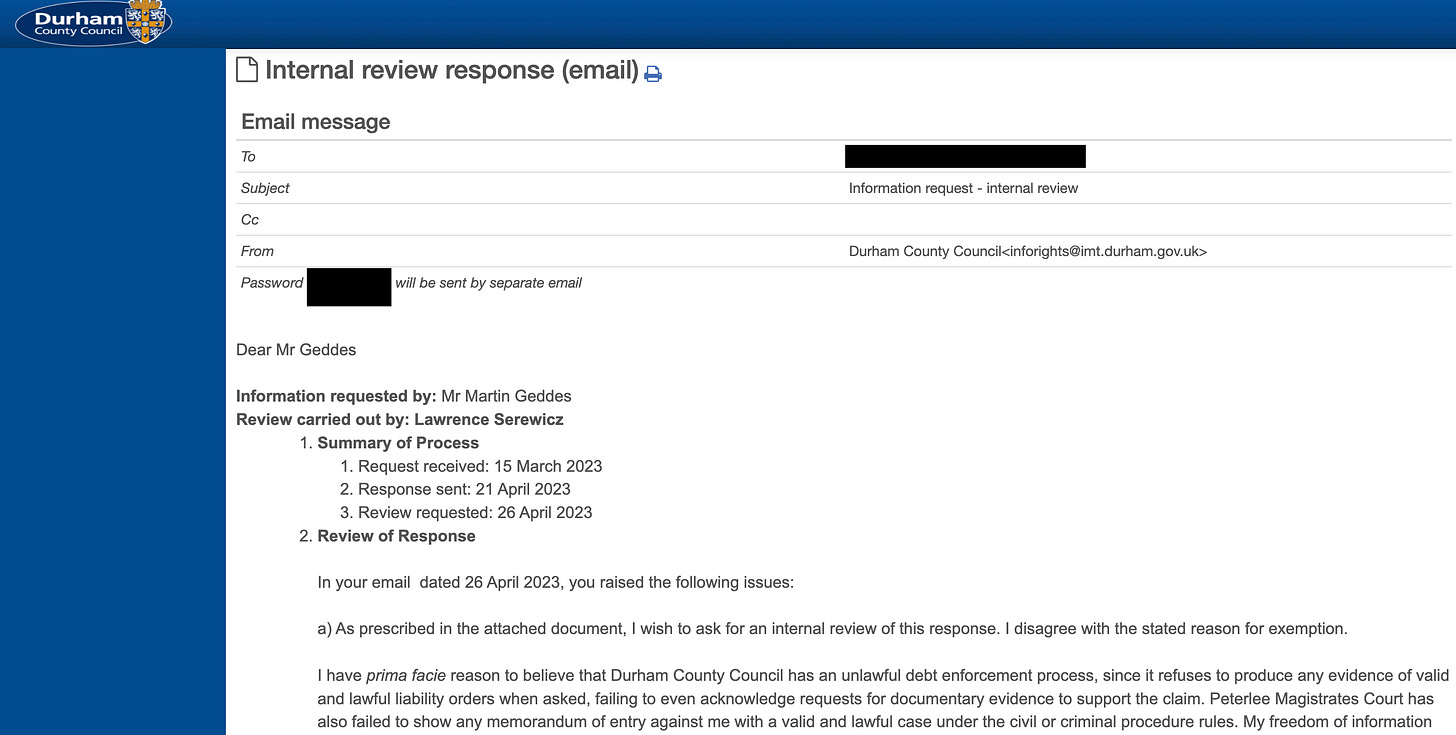Acting illegally is not an exemption from FoI
Durham County Council are saying that it is, and demanding lawfulness is vexatious
In my long-running saga on council tax with my local council, court, and police I have some updates to offer. The first is the response from Durham County Council to my appeal against their refusal to answer some simple freedom of information questions.
What is interesting about this response is not its content (as unsurprisingly the same person finds that their cover-up is still valid), but its format. They have sent it as a private web page that they control and with a password that expires. In other words, there is not even a proper email to me leaving an audit trail I control, let alone a letter with a signature making a living man or woman accountable.
Remember, that all I have done is asked one question: is there a policy document on how correspondence to the Chief Executive is handled, and can I have a copy. This was originally classed as vexatious, and I am going through the official process to make them expose themselves as accomplices to serious organised crime.
Decision
The final decision of this review is that it Does not uphold your complaint.
When considering whether a request is vexatious the council must consider and apply the concepts of “proportionality” and “justification”. In other words, is it reasonable, within the context, to consider whether the request meets the criteria for being vexatious and therefore an abuse of the access to information right or does not serve the purpose for which the freedom of information legislation was designed to achieve.
I asked if a policy document exists. On correspondence. With the public. About crime. It’s ordinary.
In assessing a request, we must consider, but not exclusively consider, the following themes in the request.
1. the burden (on the public authority and its staff);
2. the motive (of the requester);
3. the value or serious purpose (of the request); and
4. any harassment or distress (of and to staff).
The two that suggest the request is vexatious are the second and third items, the motive and value or serious purpose of the request.
Of course the real answer is “4” — being held accountable makes them nervous, as they know they are aiding and abetting a crime. The motive of holding people to account is not a reason to dismiss the request.
The context for this request is a dispute over council tax. In particular, you are raising and seeking to resolve legal questions through the FOIA process. The FOIA process is for recorded information, it is not a dispute resolution process nor is it a forum for debate. Moreover, the FOIA process is there to serve a public interest not a private or personal interest solely for the applicant since the process involves public resources that serve the public not simply an individual.
Not a legal question — I am only asking if my complaint about (lack of) due process was being handled according to policy. If it is not, because the council is committing a criminal fraud, that is a separate matter. As a statement of fact I have asked for documentary evidence of their claim, and they have offered none, so it is quite reasonable for me to inquire as to why this is.
The motive, as set out above, is to dispute the council tax liability order process and to suggest, or argue, that these liability orders are illegal. Thus, the requests for information, which appear mild or unobtrusive at the start become increasingly focused on the presumption that the council is knowingly acting illegally.
Wow… he is literally saying that “because this leads to crime, that’s a reason not to respond”. It is literally a written admission of guilt of intent to cover up fraud!
If you make a claim, in law you have to offer proof. They have had every opportunity to do so, and will not acknowledge the request. So now it is a legal fact that no liability order exists against me, since they have not rebutted any of my notices.
Now they have to engage in a cover-up, and that’s where the big problems come, as ever more processes have to go outside of policy and law, and mistakes are made — like using expiring web pages with passwords rather that normal correspondence.
These are not matters for FOIA to resolve nor are the questions, nominally badged as requests for recorded information, focused on obtaining information so much as structured and written with premises that indicate either a failure to provide the information implies a criminal act or that the council is knowingly acting illegally if it does attempt to answer them.
Freedom of information requests specifically exist to hold organisations to account when they are acting in ways that are unethical or unlawful. Durham County Council is using this as a reason not to respond.
If you believe the council is acting illegally, then that is either a matter for the relevant court or for the relevant police authority and you should seek relevant legal advice to pursue the matter either with the courts or the police.
Coming up next… articles on how the court and police are refusing to be accountable or enforce the law. But here is their core claim: they are able to dismiss any freedom of information request that relates to potential criminal activity at the council, and direct you to make a criminal complaint instead. So the gathering of evidence in advance is disallowed.
This itself is mens rea — an intention to act dishonestly and dishonourably. If the council was acting lawfully, then they would not have any problem with my request.
The other theme is the value of the request. In the context of council tax dispute, the value of the request and its focus do serve an apparent value for the wider public. To inquire whether there is a policy for handling post within the context of alleged criminal activity does not serve a wider value to the public.
Apparently the wider public would quite like the council to be able to ignore complaints of criminal activity! Quite a claim… that the motive of exposing crime is not of value.
The request is made within the context of an ongoing complaint/dispute with the council.
You bet, that’s how freedom of information requests work. If you don’t like it, get another job!
As you wrote above: "I have a legitimate personal interest in knowing whether my own correspondence and complaint is being managed according to policy or not."
The complaints handling process is where questions of whether the complaint is being handled appropriately are addressed not the public domain as set out in the FOIA. Please contact the relevant complaints officer assigned to you your complaint. Moreover, by pursuing a complaint related issue through the FOIA process you further taxes the council's limited resources for a personal interest that does not serve a wider public interest. In other words, you are taking up two unrelated processes to further your interest.
This is a lot of work to respond, when all I asked was if a single policy document exists. If the CEO’s team are coving his ass by using the internal complaints process (for non-criminal activity that is out of policy) to cover up crimes, then I am hardly going to get justice from them, am I! Which is why I need the policy document to know who is the right person to complain to about potentially criminal matters.
Moreover, there is a regulator for managing the complaints process, the Local Government Ombudsman who oversees that process, where you are dissatisfied with the council's handling of your complaint.
We have friends who can send you in more circles… as the whole system of local government collapses if the council tax fraud becomes fully exposed.
As information officers, we have a duty to protect the resources (in the broadest sense of the word) of the public authority from being squandered on disproportionate use of the Act, I find that your request meets the standard for being vexatious and thereby an improper use of formal procedure to pursue an issue for which alternative means exist to resolve it.
The real story is “we have an allegiance to our institution and the salaries and pensions it gives us, and malfeasance in public office is standard operating procedure and nobody else is quite as vigorous in holding us to account as you are so go away”.
If you are not content with the outcome of this Internal Review you have the right to apply directly to the Information Commissioner’s Office for a further decision. …
Yours sincerely
Lawrence Serewicz
Information and Records Manager
The ICO has just rebuked two councils for their attitude to engaging with the public on data subject access requests. So that’s my next step. Anyhow, Mr Serewicz has just participated in a crime by helping the council to cover up fraud. The format of the response is further evidence of desire to evade accountability and not leave a document trail that holds anyone responsible.
So I have just sent Mr Serewicz the following to his personal work email address (rather than the generic information rights one):
Ultra vires activity - Email service in accordance with precedence PT-2018-000160
Dear Mr Serewicz,
Silence-is-acquiescence-to-tyranny-and-dishonour.
Notice-to-principal-is-notice-to agent; -Notice-to-agent-is-notice-to-principal.
Applicable to all successors and assignsI have received a response to my freedom of information request appeal as an expiring web page held by Durham County Council. This appears to be an attempt to evade leaving an evidence trail of complicity to unlawful acts.
I hereby put you on notice that you are aiding and abetting criminal activity at Durham County Council (including fraud and malfeasance in public office) and that ultra vires activity means you are personally liable and do not enjoy legal protection in your role.
I have attached a copy of the web page as a Word document. Can you please confirm that this is the correct text and it is attributable to yourself personally.
Failure to rebut this notice within 14 days will be taken as acquiescence that this text is correct, and you are responsible for sending it to myself.
Martin Geddes
Two witnesses copied in.
This all ends when the minions are more scared of prison than poverty.





Great work Martin. These council staff remind me of opening a grain silo that is infested with rats. As soon as light enters the putrid stinking environment inside the silo, the rats panic and run in all directions in an effort to hide. But at the end of it all, they are still trapped inside the putrid environment they have created, and are an easy target for the rat catcher.
Council tax is a statutory tax levied on occupiers of dwellings,the statute comes from a "democratically elected parliament". It has become patently obvious that we do not live in a democracy so does the statute still stand🤔 Any answers?? My council has still not answered the questions I sent them.Keep up the good work Martin🙂